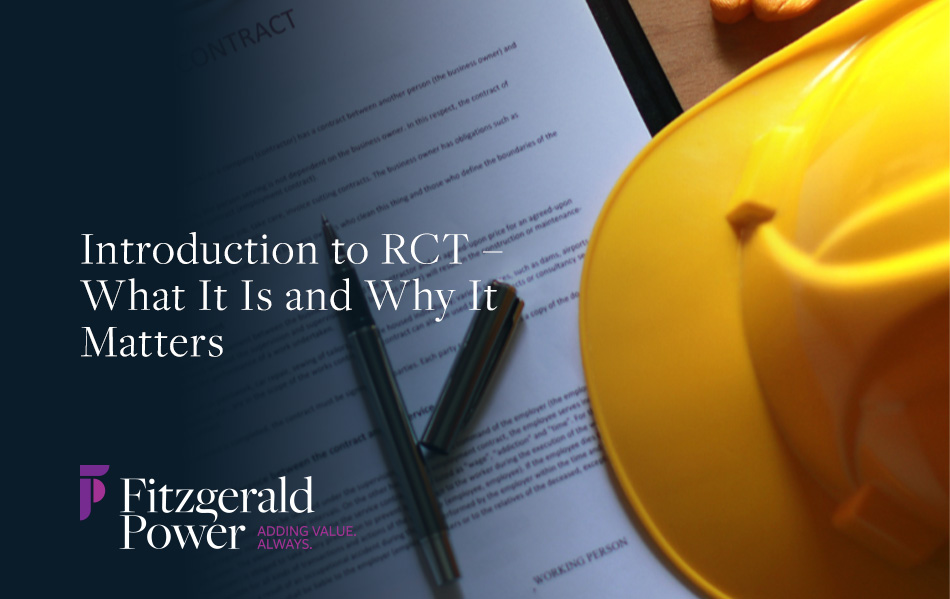What is Relevant Contracts Tax and why does it matter.
In the world of construction, forestry, and meat processing in Ireland, tax compliance is more than just a formality – it’s a legal obligation. One of the most important systems in this space is the Relevant Contracts Tax (RCT) regime. Whether you’re a principal contractor or a subcontractor, understanding how RCT works is essential to staying compliant and avoiding costly penalties.
Relevant Contracts Tax (RCT) is a withholding tax that applies to payments made by a principal contractor to a subcontractor under a “relevant contract”. It’s designed to ensure that tax is collected at source in industries where there is a perceived high risk of non-compliance. RCT is broadly similar to the Construction Industry Scheme which operates in the UK.
RCT is not a tax in itself – it’s a mechanism for collecting income tax, corporation tax, or capital gains tax from subcontractors. The tax deducted is credited against the subcontractor’s final tax liability.
Who is a principal contractor?
A principal contractor is any person or entity that engages a subcontractor to carry out relevant operations. This includes:
- Construction companies.
- Property developers.
- Local authorities.
- Government departments.
- Utility providers.
- Certain public bodies.
Even individuals or companies not traditionally in the construction business can be deemed principal contractors if they subcontract relevant operations.
What are relevant operations?
Relevant operations are defined by legislation and include:
- Construction, alteration, repair, or demolition of buildings or structures.
- Site clearance, excavation, and groundwork.
- Installation of systems (e.g., heating, lighting, telecommunications).
- Haulage of materials or machinery for use in construction.
- Forestry operations (e.g., felling, thinning, processing).
- Meat processing operations (e.g., slaughtering, packaging, cold storage).
If the work falls into one of these categories and is carried out under a contract, RCT likely applies.
Why RCT compliance is critical.
Failure to operate RCT correctly can result in:
- Penalties of up to 35% of the payment made.
- Interest charges on late payments.
- Loss of tax clearance status.
- Delays in subcontractor refunds or credits.
- Revenue audits and reputational damage.
The RCT system is fully electronic and integrated with Revenue’s Online Service (ROS), making it easier to manage – but also easier for Revenue to monitor.
RCT penalties and enforcement – What happens if you get it wrong?
Relevant Contracts Tax (RCT) is a tightly regulated withholding tax regime, and Revenue takes non-compliance seriously. Whether you’re a principal contractor or a subcontractor, failing to meet your obligations under the RCT system can lead to significant financial and reputational consequences.
This post outlines the key enforcement mechanisms, penalties, and how to avoid common pitfalls.
Why RCT enforcement is so strict.
The construction sector has historically been a high-risk area for tax evasion and underreporting. RCT was introduced in the 1970’s to ensure tax is collected at source and to improve transparency in contractor-subcontractor relationships. Revenue’s enforcement strategy is designed to:
- Deter non-compliance.
- Encourage real-time reporting.
- Ensure accurate tax collection.
- Prevent abuse of the system.
Penalties for principal contractors.
If a principal contractor fails to operate RCT correctly, they may face civil penalties based on the status of the subcontractor:
| Subcontractor Status | Penalty Rate on Gross Payment |
| Zero-rated (fully compliant) |
3% |
| 20% rate (substantially compliant) |
10% |
| 35% rate (non-compliant) |
20% |
|
Unknown to Revenue |
35% |
These penalties apply when:
- No payment notification is submitted before making a payment.
- A deduction authorisation is not obtained.
- The wrong rate is applied.
- A payment is made to an unregistered subcontractor.
In addition, a €100 surcharge applies for late returns.
The penalties are based on the gross payment so can be quite severe.
Unreported payment notifications.
If a payment is made without a deduction authorisation, the principal must submit an “unreported payment notification”. This triggers the appropriate penalty and ensures the payment is recorded. Revenue may also issue an automated penalty letter seeking agreement and payment.
Revenue audits and investigations.
Revenue actively monitors RCT compliance through:
- Cross-checking ROS submissions.
- Site visits (often in collaboration with the Department of Social Protection).
- Reviewing planning permissions and commencement notices.
- Data matching with VAT and PAYE returns.
If discrepancies are found, Revenue may raise assessments, impose penalties, and initiate audits.
“No Loss of Revenue” argument.
In some cases, a principal may argue that their failure to operate RCT correctly resulted in no actual loss to the Exchequer. While Revenue may consider this, it does not eliminate liability for penalties or interest. The burden of proof lies with the taxpayer, and the argument is unlikely to succeed where:
- There is a pattern of non-compliance.
- The subcontractor is not tax-compliant.
- The error appears deliberate.
Appeals and disputes.
Subcontractors can appeal their RCT deduction rate (e.g., from 35% to 20%) within 30 days of notification. However, principals cannot appeal penalties unless they first submit the required returns and pay the tax and interest due.
How to stay compliant.
- Always register as a principal contractor before engaging subcontractors.
- Submit contract and payment notifications via ROS before making payments.
- Keep detailed records of all contracts, payments, and deduction authorisations.
- Train staff on RCT obligations, and implement appropriate policies and procedures to ensure compliance with RCT.
Registration requirements for non-resident contractors.
Whether you’re a principal contractor or subcontractor, you may need to register for several Irish taxes:
- Value Added Tax (VAT)
- Non-resident principals must register for VAT and account for it under the reverse charge rule (typically at 13.5% or 23%).
- Non-resident subcontractors engaged in relevant contracts are not required to register for Irish VAT but may claim refunds via the Electronic VAT Refund (EVR) system in their home country.
- Subcontractors not engaged in relevant contracts but performing construction work must register and account for VAT in Ireland.
- Relevant Contracts Tax (RCT)
- All principals must register contracts and notify payments via Revenue’s e-RCT system.
- Registration is mandatory even if the principal is non-resident.
- Income Tax or Corporation Tax
- If your operations in Ireland constitute a “Permanent Establishment” (typically a site lasting more than 6 months but will depend on the relevant tax treaty), you must register for Irish Income Tax (sole trader/partnership) or Corporation Tax (company).
- Employer Registration (PAYE/PRSI/USC)
- If you employ staff in Ireland, you must register as an employer and operate Irish payroll taxes.
Claiming RCT refunds.
Refunds of RCT deducted can be claimed only if:
- You are not required to register for Irish Income Tax or Corporation Tax.
- If you are registered, you must first file your tax returns and settle any liabilities before a refund can be processed.
PPS number and tax registration.
For individuals:
- You must obtain a Personal Public Service Number (PPSN) from the Department of Social Protection.
- Required documents include a passport or national ID and proof of address.
For companies/partnerships:
- A tax registration number will be issued by Revenue upon registration.
- Each partner in a partnership must be registered individually using their PPSN.
Employee tax compliance.
If you employ staff in Ireland, you must:
- Register for PAYE/PRSI/USC.
- Ensure employees have PPSNs.
- Register jobs with Revenue and issue Tax Credit Certificates (TCCs).
Permanent establishment and double taxation.
Under Ireland’s double taxation agreements, a “Permanent Establishment” includes:
- A building site or installation project – typically lasting more than 6 months but varies between different treaties
- A place of management, branch, office, or workshop
If deemed to have a permanent establishment, you are liable for Irish tax on profits arising from those operations.
Cancelling your tax registration.
If your contract or trading activity in Ireland ends, you must cancel your tax registration by submitting a Tax Registration Cancellation Notification (Form TRCN1).
Tips for compliance:
- Use Revenue’s e-RCT system for all contract and payment notifications.
- Keep documentation up to date and certified.
- Engage a registered Irish tax agent if needed (provide their TAIN).
- Ensure all employees are properly registered and taxed.
- File returns and settle liabilities promptly to avoid penalties.
Common RCT pitfalls and how to avoid them.
In Ireland’s construction sector, compliance with the Relevant Contracts Tax (RCT) regime is not just a regulatory requirement – it’s a cornerstone of financial and reputational integrity. Yet, despite its long-standing presence, RCT continues to trip up even seasoned contractors and developers.
1. Misunderstanding what constitutes a “Relevant Operation”.
One of the most frequent errors is misclassifying whether a contract falls within the scope of RCT. According to Revenue guidance and the Tax and Duty Manual, “relevant operations” include not only traditional construction activities like building, demolition, and site clearance, but also ancillary services such as:
- Installation of heating, lighting, and telecom systems.
- Haulage of materials or machinery for use in construction.
- Geo-technical investigations involving excavation or drilling.
However, professional services like architectural design or environmental impact assessments typically fall outside the RCT net—unless they are bundled with fieldwork that is integral to construction.
Best Practice: Always assess the full scope of the contract, not just the invoice line items. If in doubt, seek advice.
2. Incorrectly splitting contracts.
Some contractors attempt to split contracts into RCT and non-RCT components to reduce their withholding obligations. As clarified in guidance, if a contract includes both relevant and non-relevant services, and they are not clearly separable, RCT must be applied to the entire contract value.
Best Practice: Structure contracts transparently. If services are genuinely distinct, document them separately with clear deliverables and pricing.
3. Failing to operate RCT on connected party transactions.
Another overlooked area is the treatment of connected parties. For example, directors or shareholders of construction companies must still operate RCT when engaging contractors for private projects or through partnerships, even if the work is on their own premises.
Tip: Don’t assume exemptions apply just because the transaction is internal.
4. Payment notification errors.
Perhaps the most avoidable pitfall is failing to notify Revenue before making a payment to a subcontractor. Each payment—even if part of a recurring contract—requires a separate Payment Notification. Skipping this step can trigger surcharges and penalties.
Best Practice: Integrate eRCT compliance into your payment workflows. Use Revenue’s ROS system to generate Deduction Authorisations before releasing funds.
5. Misapplying RCT to investment properties.
RCT does not apply when a contractor is hired to build or refurbish a property for the principal’s own use or as a long-term investment (e.g. leased for over 35 years), provided the principal is not in the business of construction.
Best Practice: Document the intended use of the property clearly. If the property is to be let short-term or sold, RCT may still apply.
6. Overlooking VAT interactions.
RCT and VAT often intersect in complex ways. For example, if a supply of goods is part of a contract that includes installation, the entire contract may fall under RCT – even if the invoice only references the goods.
Best Practice: Ensure that VAT and RCT are considered together when drafting contracts and issuing invoices. Misalignment can lead to double taxation or penalties.
7. Ignoring non-resident obligations.
Non-resident principals are not exempt from RCT if the construction work is carried out in Ireland. Many fall into non-compliance simply because they are unaware of their obligations.
Best Practice: Educate overseas clients and partners early in the engagement process. Include RCT clauses in contracts with non-resident principals.
What recent tax appeal rulings mean for construction businesses in Ireland – What is the Tax Appeals Commission?
The Tax Appeals Commission (TAC) is Ireland’s independent body that hears and decides disputes between taxpayers and Revenue. If your business disagrees with a tax assessment, a denied refund, or an RCT rate decision, you can appeal to the TAC. Their rulings are legally binding and offer valuable insights into how tax law is applied – especially in the construction sector, where Relevant Contracts Tax (RCT) is a major compliance area.
Here are five key lessons from recent TAC decisions that every construction business should know.
1. Missed the four-year deadline? No refund – no exceptions.
Several subcontractors and construction firms lost their appeals because they submitted tax repayment claims outside the four-year statutory limit under Section 865(4) of the Taxes Consolidation Act 1997. Even where delays were caused by:
- COVID-19 lockdowns.
- Health issues.
- Bereavement.
- Administrative confusion.
…the Commission ruled it had no power to override the law.
Construction Impact: If you’ve had RCT deducted and are due a refund, make sure your tax return and repayment claim are submitted within four years of the end of the relevant tax year. No exceptions are made—even for genuine hardship.
2. RCT rate depends on your compliance track record.
The RCT system applies three rates: 0%, 20%, and 35%. To qualify for the 0% rate, you must meet strict conditions under Section 530G TCA 1997, including:
- Three years of full tax compliance.
- Proper record-keeping.
- Operating from a fixed place of business.
In recent cases, even newly formed construction companies with clean records were assigned the 20% rate because they hadn’t yet built up the required compliance history.
Construction Impact: If you’re setting up a new construction business or switching from sole trader to limited company, expect to start at the 20% rate. Plan your cash flow accordingly.
3. Hire company? If you supply labour, RCT still applies.
Some businesses argued they were simply hiring out equipment (like cranes or piling rigs) and shouldn’t be treated as subcontractors. But the TAC ruled that:
- If you supply labour with the equipment (e.g. an operator), you’re a subcontractor under RCT rules.
- RCT applies even if the operator is on UK payroll or the company is based outside Ireland.
Construction Impact: If you’re hiring out plant or machinery with an operator, Revenue will likely treat you as a subcontractor. That means RCT applies, and you must register and comply accordingly.
4. Trading under a dissolved company? You lose the RCT credit.
In one case, a plasterer continued invoicing under a company name that had been dissolved. Although he declared the income personally and paid tax on it, the RCT credits (which had been deducted under the company’s tax number) couldn’t be transferred to him.
Construction Impact: Always ensure your company is active and properly registered. If you trade under a dissolved entity, you risk losing access to RCT credits – even if you’ve paid tax on the income.
5. The Burden of Proof is on you.
In every appeal, the Commission reminded taxpayers that the burden of proof lies with them. You must:
- Prove that tax is not payable.
- Show that a refund is due.
- Provide clear documentation.
The Commission won’t investigate on your behalf.
Construction Impact: Keep detailed records of contracts, RCT deductions, tax filings, and correspondence with Revenue. If you’re appealing a Revenue decision, be ready to present a strong, well-documented case.
Final word for construction firms.
These rulings highlight the importance of proactive tax compliance in the construction sector. Whether you’re a subcontractor, plant hire company, or main contractor, understanding how Revenue and the TAC interpret the law can help you avoid costly mistakes.
If you’re unsure about your RCT rate, facing a repayment issue, or preparing for a Revenue audit, our tax advisory team is here to help. We work with construction businesses across Ireland to ensure compliance, manage risk, and protect your bottom line.
Get in touch today to discuss how we can support your business.






